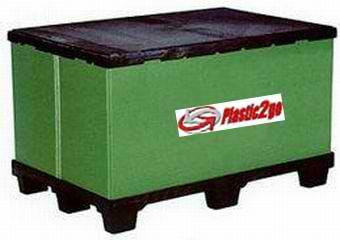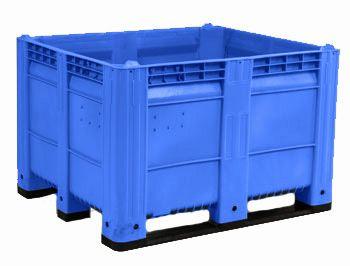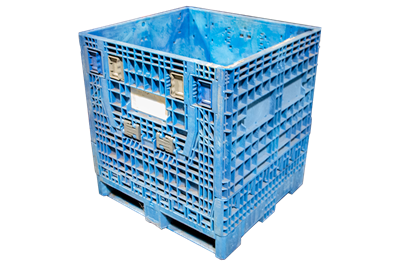All Concerning Mass Plastic Containers: Advantages, Applications, and Sector Insights
Bulk plastic containers play a significant duty in various markets, providing benefits that boost performance and sustainability. Their light-weight nature lowers shipping expenses, while their durability assurances risk-free storage and transportation of diverse products. As companies significantly seek eco-friendly remedies, the demand for these containers is growing. This elevates essential questions concerning the products utilized and the fads affecting their style. What effects do these elements have for the future of mass plastic containers?
Advantages of Mass Plastic Containers
Mass plastic containers supply a multitude of benefits in various sectors. Their light-weight style notably decreases transport costs, enabling efficient logistics and simpler handling. Furthermore, these containers provide longevity and resistance to weather components, chemicals, and physical impact, guaranteeing the secure storage space and transportation of goods. The adaptability of mass plastic containers enables them to be built into various forms and dimensions, dealing with certain industry needs.

Common Applications Across Industries
While different industries make use of bulk plastic containers, their applications are especially famous in fields such as food and beverage, pharmaceuticals, farming, and manufacturing. In the food and beverage industry, these containers are necessary for storing and carrying products like grains, liquids, and prepared meals, ensuring quality and safety and security. The pharmaceutical field counts on mass plastic containers for secure storage space of medicines and injections, keeping conformity with stringent policies.
In farming, these containers promote efficient handling and transportation of fruit and vegetables, fertilizers, and chemicals, while also supporting sustainable practices through recyclability. Manufacturing industries use bulk plastic containers for parts storage and setting up line procedures, promoting company and process effectiveness. In addition, these containers serve a significant role in logistics and supply chain monitoring, streamlining the motion of products throughout different industries. Generally, the versatility of mass plastic containers makes them essential across several markets.
Material and Layout Factors To Consider
When choosing bulk plastic containers, material and layout considerations play a necessary duty in making sure capability and compliance with industry standards. The choice of product substantially impacts the container's sturdiness, weight capability, and resistance to environmental variables. Typical materials consist of high-density polyethylene (HDPE) and polypropylene, known for their strength and chemical resistance.
Design elements, such as shape, closure, and dimension devices, also affect functionality. Containers with ergonomic deals with and stackable styles enhance storage effectiveness and ease of transport. Furthermore, features like venting or drain openings may be needed for certain applications, permitting for air circulation or fluid removal.
Conformity with safety and security guidelines, such as FDA authorizations for special info food-grade applications, is vital. plastic bulk containers. Generally, mindful consideration of materials and style can enhance efficiency and durability, making certain that mass plastic containers meet the diverse requirements of numerous markets properly
Trends wholesale Plastic Container Use
As markets evolve, the use of mass plastic containers is progressively affected by sustainability and efficiency. Firms are choosing green products, such as recycled plastics, to reduce ecological influence while maintaining toughness. This change is driven by customer need for regulatory stress and sustainable practices targeted at decreasing plastic waste.
The pattern towards automation in logistics and supply chain administration is improving container styles. Bulk containers are currently being engineered for compatibility with automated systems, improving operational efficiency. Lightweight layouts are also getting traction, as they minimize delivery costs and energy consumption throughout transport.
In addition, customization is coming to be a focal point, my link permitting organizations to tailor containers to details needs, therefore maximizing area and functionality. These fads reflect a wider dedication to sustainability, technology, and efficiency within numerous industries, ensuring that mass plastic containers remain to play a crucial duty in contemporary supply chains.
Ideal Practices for Storage and Transportation
Efficient storage space and transportation of mass plastic containers need adherence to best methods that improve safety and security and effectiveness. Containers should be piled safely, assuring that weight is evenly distributed to protect against tipping or damages. Making use of pallets can help with much easier motion and safeguard the containers from ground dampness. Additionally, appropriate labeling is important for fast recognition and monitoring throughout transportation.
Temperature control is an additional essential element; extremes can jeopardize the integrity of the products. It is suggested to save containers in a climate-controlled atmosphere when required. For transport, selecting appropriate cars made for bulk loads warranties stability and decreases risk throughout transit.
Regular inspections of containers before storage and transportation help determine any wear or damages, permitting timely maintenance or replacement. By following these ideal practices, companies can maximize the lifecycle of mass plastic containers while preserving functional effectiveness.
Often Asked Concerns

Are Mass Plastic Containers Recyclable After Use?
Yes, bulk plastic containers are frequently recyclable after use. Recyclability depends on the material kind and regional recycling programs. Proper cleaning and sorting are important to assure they are accepted by recycling facilities.

What Is the Life-span of Bulk Plastic Containers?
The lifespan of mass plastic containers normally ranges from five to 10 years, relying on use problems, material top quality, and environmental elements. Bulk Plastic Containers. Correct maintenance can expand their toughness, making them a lasting storage remedy
Can Mass Plastic Containers Be Customized?
Yes, bulk plastic containers can be personalized. Manufacturers frequently provide alternatives for size, material, branding, and shade, allowing services to tailor containers to their details demands and enhance their product this link discussion and functionality.
Exactly How Do Bulk Plastic Containers Contrast in Price to Alternatives?
Mass plastic containers commonly offer a reduced cost compared to choices like steel or glass, due to their lightweight nature and durability. This makes them an economical selection for services requiring efficient storage options.
Are There Safety And Security Rules for Making Use Of Mass Plastic Containers?

Mass plastic containers play a significant duty in numerous industries, offering benefits that boost performance and sustainability. While different industries use bulk plastic containers, their applications are specifically famous in fields such as food and drink, pharmaceuticals, agriculture, and production. Production sectors utilize bulk plastic containers for components storage space and assembly line procedures, promoting organization and operations effectiveness. When choosing mass plastic containers, material and design factors to consider play an essential duty in making sure capability and compliance with industry requirements. As sectors evolve, the use of bulk plastic containers is increasingly affected by sustainability and effectiveness.